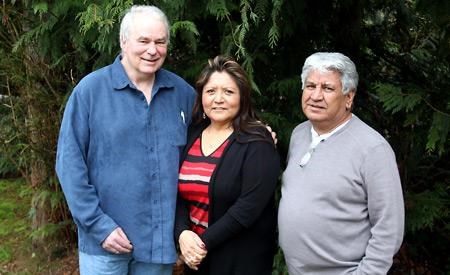Approximately 20 people gathered at Tla’amin Community Health last month to hear information about an upcoming workshop that will help build new bridges and strengthen existing ties between aboriginal and other Canadian communities.
Chief Robert Joseph and John McCandless are leading a relationship-building workshop called Bright New Day Reconciliation Circle at the Salish Centre at Tla’amin (Sliammon) First Nation mid-March. They are part of Chief Robert Joseph and Associates, a North Vancouver educational firm which focuses on developing a culture of understanding.
“The more we get to know each other, the more we can appreciate each other’s values,” said McCandless. “When we begin to understand where each other is coming from, the less likely we are to want to damage the relationship.”
Joseph and McCandless developed the workshop after Prime Minister Stephen Harper’s 2008 apology for the government’s use of residential schools to assimilate aboriginal children and the lasting harm it caused which has rippled through generations.
“It was an incredible moment,” said McCandless, “but we realized that the apology wouldn’t lead too far if we couldn’t create a grassroots movement to meet it.”
Joseph and McCandless have been conducting reconciliation workshops across the province since 2009 for mixed audiences of both aboriginal and non-aboriginal Canadians. The Tla’amin reconciliation circle will be number eight for the pair.
“Each one of them gets a little better,” said McCandless. “Each one, we fine tune a bit more.”
John Louie is a men’s support worker for Tla’amin Community Health, and attended residential school as a child. He became interested in the work of Joseph and McCandless after participating in a reconciliation circle for Vancouver’s Musqueam First Nation in October 2012.
“A lot of our history is not written down in books,” said Louie. “In my way of thinking, we need a way to put that out to the community.”
The circle has three elements. During the first part participants share the stories of their lives and the story of Canada which gives a better understanding of the present.
“Telling all our stories opens the door to what we call the sanctuary of our humanness and it helps us realize that we all have the same kinds of desires and needs,” said McCandless.
During the second part of the workshop, participants are asked to imagine a shared future and talk about what they would like to include in it. “It’s only when we begin to understand all our stories that we can start to imagine who we can be,” he added.
Taking a reconciliation action is the final step in the process. “We don’t really want to just have a report written at the end that just sits on someone’s desk,” he said. “We really want reconciliation actions, after the doors to the workshop close, to stay connected.”
McCandless cites the work renovating a contentious chapel on the grounds of St. George’s Residential School in Lytton, BC as part of the reconciliation process to create, what he called, “a new kind of energy coming from that place.”
Participants in Bright New Day can expect a highly interactive, friendly experience of cooperation and collaboration. The participants will be both the “presenters” and the “experts.”
The Tla’amin reconciliation circle is planned for Thursday and Friday, March 14 and 15 at the Salish Centre. Organizers of the event are planning a celebration of diversity with the Wu Woom Festival following the workshop Friday evening.
Tickets for the two-day workshop, which include lunches, a dinner and networking breaks cost $336 including tax.
For more information about the workshop or to register for the event, readers can visit online or contact Cyndi Pallen at Tla’amin Community Health 604.483.3009.
Close vote passes
Powell River Regional District directors split on a vote to fund the participation of two representatives at the reconciliation workshop.
The vote at the February 28 board meeting was on a motion to authorize Director Patrick Brabazon and Al Radke, chief administrative officer, to attend the Bright New Day Reconciliation Circle, at a cost of $600 plus a per diem allowance.
The weighted vote was used, a system, based on population, that allows the City of Powell River seven votes and Electoral Area C two votes.
Three directors, Maggie Hathaway, Stan Gisborne and Dave Murphy, voted in opposition to the motion, for a total of six votes. However, four directors, Jim Palm, Colin Palmer, Merrick Anderson and Brabazon, were in favour of the motion, for a total of seven votes.



